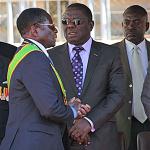16 August 2010

Photo: AP
Zimbabwean President Robert Mugabe, left, walks past Prime Minster Morgan Tsvangirai, during Defense Force Day Commemorations in Harare, 10 Aug 2010
Political analysts say the Movement for Democratic Change Prime Minister Morgan Tsvangirai has little control over the inclusive government he formed with President Mugabe and his ZANU-PF party. They say the Global Political Agreement - which is the foundation of the unity government - has made painfully slow progress.
The agreement was signed after a disputed presidential election in 2008. Mr. Tsvangirai beat Mr. Mugabe, but official results showed neither candidate won enough votes to avoid a runoff. Mr. Mugabe won the second round after Mr. Tsvangirai dropped out, citing killings and beatings of his supporters.
South African President Jacob Zuma is leading the Southern African Development Community's mediation efforts in Zimbabwe. During the regional summit, he is expected to report on the progress of the outstanding issues in the power-sharing government.
The Media Monitoring Project of Zimbabwe says that since the unity government was formed, there has been greater media freedom in Zimbabwe, with many journalists now accredited and a new daily newspaper circulating on Harare's streets. But, it adds, the so-called public broadcaster, the Zimbabwe Broadcasting Corporations' four radio channels and one television network, blatantly promote Mr. Mugabe's ZANU-PF party.
There are still significant obstacles in the way of substantial electoral reform, according to Zimbabwe Lawyers for Human Rights and the Zimbabwe government's Human Rights Commission, which now has commissioners but has no legislation allowing it to operate.
Many analysts in Harare see the most serious outstanding issue as the attorney general's position, which Mr. Mugabe filled with an outspokenly pro-ZANU-PF lawyer. The MDC wants a new and independent attorney general.
Many Zimbabweans in Harare's streets are infuriated with the slow progress of implementation of the Global Political Agreement. Sizani Qabuto, a Harare lawyer said Zimbabweans depended a great deal on Mr. Zuma at the SADC summit.
"We want to move on, and it is upon the SADC to make sure - especially Jacob Zuma as the main negotiator - to make sure that these trivial issues amongst politicians are dealt with once and for all, and we move on as a country," said Qabuto. "We cannot tolerate this; we are now sick and tired."
While the economy has stabilized since the inclusive government came to power in February 2009, MDC Finance Minister Tendai Biti says jobs continue to be lost in the productive sectors.
A South African foreign affairs statement Monday said there were "positive trends" from economic rehabilitation programs.
Despite some progress and better harvests in 2010, Zimbabwe needs emergency food aid this year for 1.7 million people, according to the United Nations.
Ellen Shiri, a secretary in Harare holds little hope that the SADC summit will deliver much.
"As an ordinary Zimbabwean, there isn't much that we are expecting from SADC considering the member sates are polarized," said Shiri. "We hope Zuma will flex his muscles, as we know there are a lot of outstanding issues, which need to be rectified."
According to the political agreement mediated by South Africa, Zimbabwe should now be going to a referendum to decide on a new constitution ahead of fresh elections. The process of drawing the constitution is only now beginning.
The MDC also says that consultations with people meeting to express what they want in the new charter have been regularly interrupted in some rural areas by ZANU-PF militia.